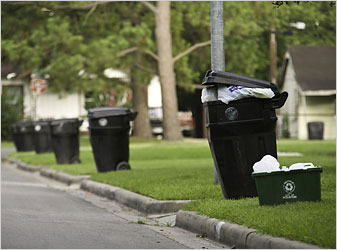The reason for the problem can be summed up: Waste Management. They are and have always been a "bottom line" company. They talk the talk and walk the walk with the politicans, but their narrow focus is on huge executive salaries, shareholder returns and certainly never the communities they serve at all. If you check their history, you'll find it never has been, certainly isn't and probably never will be.
Our County shares a common dump with a local trash pick-up provider. 90% of the "problems" at the common dump site are attributable to WM. Their fees are 50% higher than the local fellow, who is certainly no saint. (He lost a major law suits and arranged for rate payers to pay hiss fine.) But you can only hope that a NYSE company would be a better citizen. Alas, there is much too much cash money floating around and weak law enforcement, caring and garbage itself is so revolting.
It should be simple: The publically elected commissioners/council members, the folk we elect to watch out for us, can easily say: "This is what you will do, or you do not have a contract, and take your trucks somewhere else. We have others who will do it right."
Blog Post
Suburban sprawl and recycling don't mix

The city's sprawling, no-zoning layout makes collection expensive, and there is little public support for the kind of effort it takes to sort glass, paper and plastics. And there appears to be even less for placing fees on excess trash. "We have an independent streak that rebels against mandates or anything that seems trendy or hyped up," said Mayor Bill White, who favors expanding the city's recycling efforts. "Houstonians are skeptical of anything that appears to be oversold or exaggerated. But Houstonians can change, and change fast." High fuel costs do not help either. "I'm not going to send my truck 50 miles to pick up one can," said Chris Hickman, a recycling manager at Waste Management, the nation's largest waste company, whose headquarters is here. ...Private businesses, like office towers, apartment complexes, and restaurants, are responsible for their own garbage, although advocates of recycling are pleading with the city to regulate them. Commercial recyclers say that despite a recent increase in public interest, their services remain a tough sell.Countering high fuel costs are high commodity prices, leading recycling rates higher in places like Boulder, Colorado. Eric Lombardi runs director of Ecocycle, the nation's largest nonprofit recycler, in Boulder:
Mr. Lombardi's operation claims a 60 percent recycling rate, despite landfill fees of $15 a ton -- less than half of Houston's costs. With commodity prices at a record high, he said, if recycling can be profitable "in my landlocked state without easy access to buyers like China, then it can be profitable anywhere."The full article from the Times is here. Photo: Michael Stravato for The New York Times
Published July 29, 2008 Permalink Citation
(2008, July 29). Suburban sprawl and recycling don't mix. Retrieved from https://www.buildinggreen.com/news-article/suburban-sprawl-and-recycling-dont-mix



Add new comment
To post a comment, you need to register for a BuildingGreen Basic membership (free) or login to your existing profile.